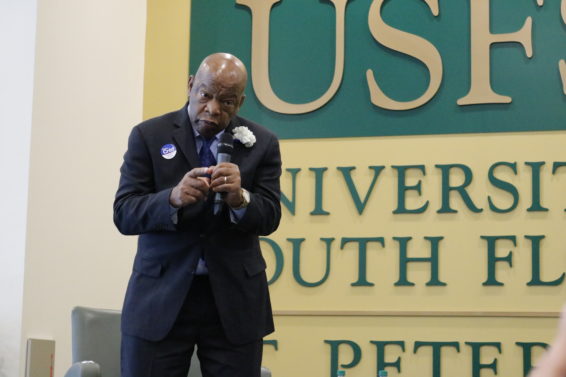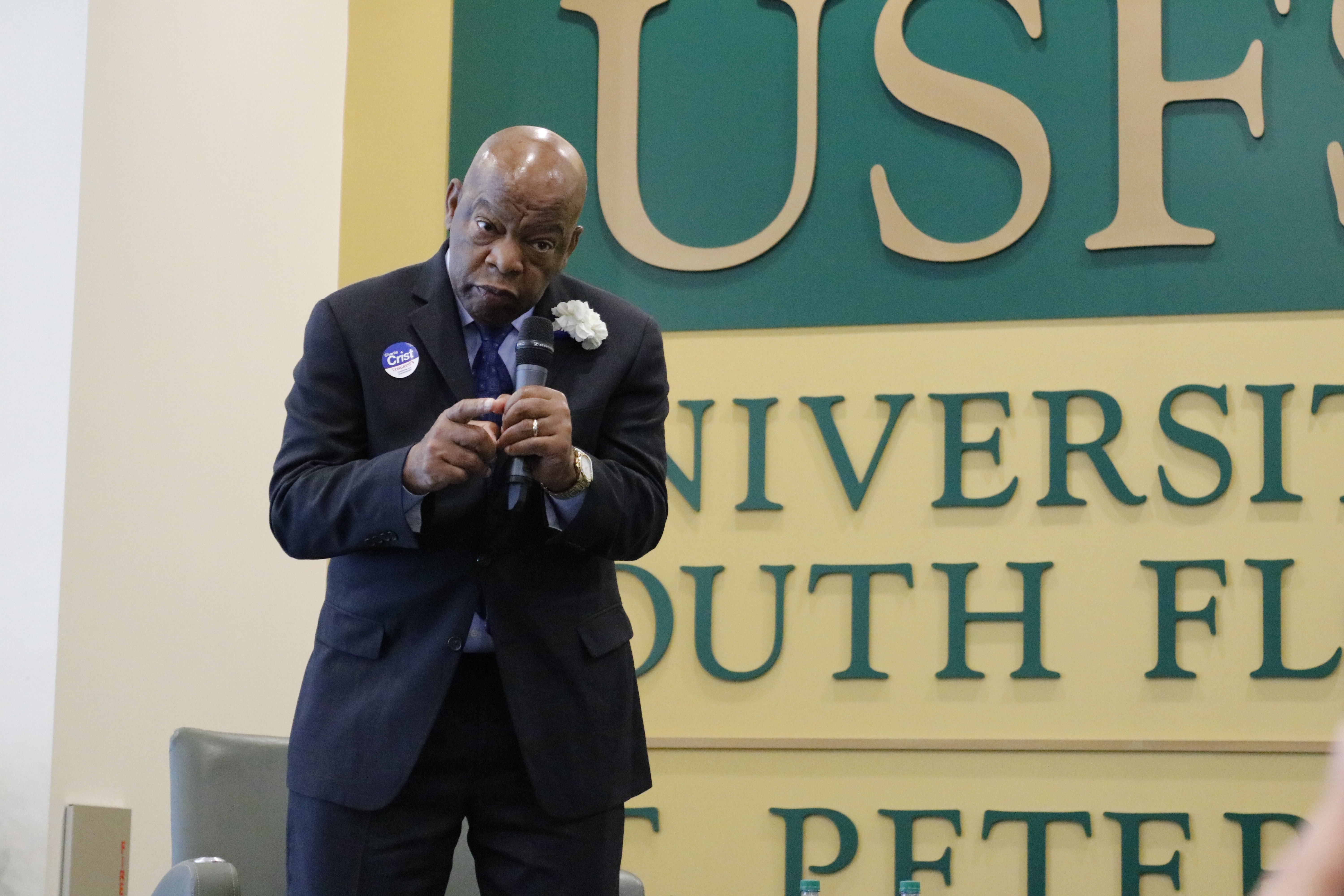The iconic civil rights hero, Congressman John Lewis, spoke on campus Wednesday to urge students to get out and vote.
Lewis, 72, a Democrat who represents Georgia’s 5th congressional district, told students that their right to vote was special.
“The right to vote is precious and to vote is almost sacred. It is the most powerful nonviolent tool we have in our democratic society,” Lewis said to a crowd of nearly 200 people.

Lewis told the audience in the USC Ballroom, Nov. 2. “It’s easy. So you just have to do it.” (Devin Rodriguez | TCN)
In the 1960s, Lewis led a number of nonviolent efforts to give black citizens the right to vote. These efforts once culminated in bloodshed when he marched with nearly 600 people from Selma, Alabama to Montgomery.
The protesters were stopped outside of Selma by state troopers, who attacked them. 67 were left injured. Lewis suffered a fractured skull.
“I almost died on that bridge in Selma for the right to vote,” Lewis said. “It’s easy. So you just have to do it.”
On the stage beside Lewis stood former Gov. Charlie Crist, who is currently in a heated campaign against Republican David Jolly for the 13th congressional district of Florida. Crist also warned students of the dangers of not voting this year.
“There’s a saying in politics: ‘If you’re not at the table, then you’re probably going to be on the menu,’” Crist said.
Black voters are not turning out for the Hillary Clinton campaign as much as they did for Barack Obama in the last two presidential elections. These voters make up around 13.4 percent of Florida’s electorate and are a core Democratic demographic.
But Lewis said that there is still time.
“We still have a few days to go. I think many will be voting in the next few days and many more will vote on the eighth,” Lewis said. “I’ve been spending time in this state, in Georgia and many other parts of America and I think people are going to be at the polls. We will catch up!”
He also expressed concern about the rhetoric of divisiveness coming from Donald Trump. Recently, Trump has warned his voter base of an impending loss due to a rigged system, a statement that has been heavily contested by many news sources including the Tampa Bay Times.
Lewis countered with a message of unity.
“We’re one people,” he said. “We all live in the same house, the American house.”
He then told the story of how a former Ku Klux Klan member came to him 40 years after the violent incident in Selma. The man said that he was one of the people who beat and bloodied the congressman and asked for forgiveness. Lewis accepted the apology and forgave him.
“We need to humanize our politics, humanize our institutions,” Lewis said. “We need to be prepared to forgive.”
There is still racism and voter suppression in the United States, and since the Supreme Court struck down the heart of the Voting Rights Act in 2013, there is less protection for minority groups. Long lines and voter purges have only served to weaken the work of Lewis over the years.
But the congressman said he still holds hope.
“We’ve come such a distance, we’ve made unbelievable progress. I am hopeful. I am optimistic,” Lewis said.
“You cannot get down, you have to know that you’re going to get there, and I believe we will get there as a nation and as a people. Maybe not in my lifetime but each of us must do what we can to at least make a down payment on where we want to go. I believe when we get there, we will serve as a model for the rest of the world.”
Lewis was brought to campus in part because of the Suncoast Sierra Club. Victor St. Arnauld, an environmental science and policy student, is an intern for the club. After seeing a majority of his class express their disinterest in voting, he spoke up.
“A lot of students believe that their vote doesn’t matter,” Arnauld said. “How are you going to make a difference if you don’t use your vote?”
Arnauld said that one of his biggest concerns was Amendment 1, which will limit private solar energy consumption. The ballot initiative was funded by utility companies like Duke Energy and Florida Power & Light.
Arnauld said that even if students weren’t interested in the presidential election, they should care about the other issues on the ballot.



